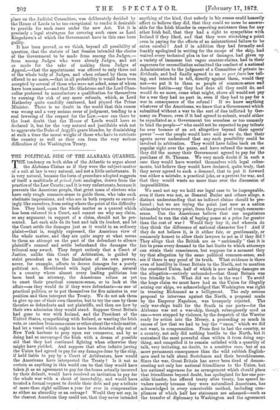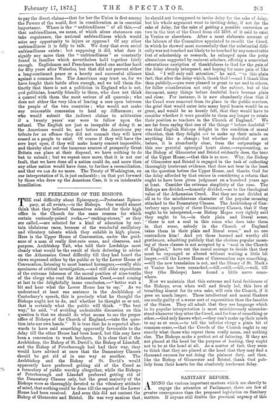THE POLITICAL SIDE OF THE ALABAMA QUARREL.
THEtendency on both sides of the Atlantic to argue about the Alabama Claims as if they were the subject-matter of a suit at law is very natural, and not a little unfortunate. It is very natural, because the form of procedure adopted suggests of itself a multitude of prinui facie analogies, drawn from the practice of the Law Courts; and it is very unfortunate, because it prevents the American people, that great mass of electors who have only rough common-sense to guide them, who take such obstinate impressions, and who are in both respects so exceed- ingly like ourselves, from seeing where the point of the difficulty lies. They look upon the whole matter as a quarrel which has been referred to a Court, and cannot see why any claim, or any argument in support of a claim, should not be pre- sented. Let each side do its best and talk its loudest, and let the Court settle the damages just as it would in an ordinary plaint—that is, roughly expressed, the American view of the whole matter, and they are quite angry at what seems to them an attempt on the part of the defendant to silence plaintiff's counsel and settle beforehand the damages the tribunal may award. They forget entirely that a Court of Justice, unlike this Court of Arbitration, is guided by strict precedent as to the limitation of its own powers, never, for example, affects to decree damages for a purely political act. Bewildered with legal phraseology, natural in a country where almost every leading politician has been bred an attorney, the Americans refuse as yet to exert their practical common-sense, or to look at the affair—as they would do if they were defendants—as one of practical politics, or to put themselves for five minutes in our position and then interpret the Treaty. We do not ask them to give up one of their own theories, but to try the case by those theories as defendants and not plaintiffs, and then see how by their own admission they would stand. Suppose Great Britain had gone to war with Ireland, and the President of the United States, sympathizing with Ireland, or wanting the Irish vote, or careless from some cause or other about the whole matter, had let a vessel which ought to have been detained slip out of New York harbour to prey upon our commerce, and by so doing had so encouraged the Irish with a dream of possible aid that they had continued fighting when otherwise they might have yielded. And suppose that after infinite jarring the Union had agreed to pay for any damages done by the ship, if held liable to pay by a Court of Arbitrators, how would the Americans have interpreted the Treaty ? Is it not as certain as anything in this world can be that they would have taken A as an agreement to pay for the losses actually incurred by their default, would have received an invitation to pay for the whole war with a shout of incredulity, and would have treated a formal request to double their debt and pay a tribute of more than eight millions a year for ever in compensation as either an absurdity or an outrage ? Would they not say, in the clearest American they could use, that they never intended anything of the kind, that nobody in his senses could honestly affect to believe they did, that they could no more be answer- able for the Irish blunder in expecting assistance than for any other Irish bull, that they had a right to sympathize with Ireland if they liked, and that they were stretching a point even in paying for the effects of an unintentional failure to be extra careful ? And if in addition they had formally and frankly apologized in writing for the escape of the ship, had waived every technical plea in bar of damages, had given up a variety of immense but vague counter-claims, had in their eagerness for reconciliation submitted the conduct of a national Administration to the judgment of a Committee of private in- dividuals, and had finally agreed to an ex post facto law tell- ing, and intended to tell, directly against them, would they not—we put it to them as people of common-sense and business habits—say they had done all they could do, and would do no more, come what might, stove all would not pay for a war they had no part in, even if they had to pay for a war in consequence of the refusal ? If we know 'anything whatever of the Americans, we know that a Government which submitted without a war to the sort of fine inflicted by Ger- many on France, even if it had agreed to submit, would either be repudiated as a Government too senseless or too unmanly to bind the people—" who could not be expected to pay tribute for ever because of an act altogether beyond their agents' power "—or the people would have said as we do, that their agents never understood that any such possibility could be involved in arbitration. They would have fallen back on the popular right over the purse, and have refused the money, as they did the money their Government agreed to pay for the purchase of St. Thomas. We very much doubt if in such a case they would have worried themselves with legal refine- ments, but believe they would have declared, quite truly, that they never agreed to such a demand, that to put it forward was either a mistake, a practical joke, or a pretext for war, and that they would -waste no more time over the discussion of impossibilities.
We need not say we hold our legal case to be impregnable, even if there was not, as General Butler and others allege, a distinct understanding that no indirect claims should be pre- ferred ; but we are trying the point just now as a nation ultimately tries every point, from the ground of rough common- sense. Can the Americans believe that our negotiators intended to run the risk of buying peace at a price far greater than the cost of war ? Would they buy it, and wherein do they think the difference of national character lies ? And if they do not believe it, is it either fair, or gentlemanly, or commonly honest to allow their lawyers to act as if they did ? They allege that the British are so " unfriendly " that it is fair to press every demand to the last limits to which attorneys can strain their consciences, but suppose for a moment they try that allegation by the same political common-sense, and see if there is any proof of its truth. What evidence is there even of hostility in Great Britain to the North, not to mention the combined Union, half of which is now asking damages on the allegation—entirely unfounded—that Great Britain was too friendly to it. What did we do in the war ? To avoid the huge claim we must have had on the Union for illegally seizing our ships, we acknowledged that Washington was right in treating Richmond as a belligerent. The only serious proposal to intervene against the North, a proposal made by the Emperor Napoleon, was brusquely rejected. The only war-ships built for the South in our ports—for the Alabama was not a war-ship, though subsequently used as one—were stopped by violence, by the despatch of the Warrior ready for action into the Mersey, a proceeding so much in excess of law that we had to buy the "rams," which we did not want, in compensation. From first to last the country, as a country, not only did nothing hostile to the North, but it restrained the most powerful class within it from doing any- thing, and compelled it to remain satisfied with a quantity of talk, very irritating, no doubt, to a sensitive race, but of no more permanent consequence than the wild rubbish English- men used to talk about Bcotchmen and their breechlessness. Since the war, Great Britain has never been tired of demon- strating not only her national friendliness to the Union, but her national eagerness for an arrangement which should place that friendliness beyond doubt, has apologized for her one pos- sible blunder, has offered treaty after treaty, has spared in- vaders merely because they were naturalized Americans, has acknowledged in every conceivable method, including com- pliances of which half her statesmen are ashamed—such as the transfer of diplomacy to Washington and the agreement
to pay the direct claims—that for her the Union is first among the Powers of the world, first in consideration as in essential importance. Where is the " unfriendliness " of all this,—of that unfriendliness, we mean, of which alone statesmen can take cognizance, the national unfriendliness which would seize any opportunity to injure or oppress ? Of any other unfriendliness it is folly to talk. We deny that even social unfriendliness exists ; but supposing it did, what does it signify any more than the " unfriendliness " so constantly found in families which nevertheless hold together fairly enough. Englishmen and Frenchmen hated one another hard for fifty years after Waterloo, but that did not prevent either a long-continued peace or a hearty and successful alliance against a common foe. The Americans may trust us, for we have fought their battle often enough, and we tell them dis- tinctly that there is not a politician in England who is not, qud politician, heartily friendly to them, who does not think a quarrel with them the most serious of all quarrels ; who does not abhor the very idea of leaving a sore open between the people of the two countries ; who would not make any reasonable concession to heal up differences ; or who would submit the . indirect claims to arbitration if a twenty years' war were to follow upon the refusal. The English are just as incapable of doing it as the Americans would be, and before the Americans pay tribute for an offence they did not commit they will have ceased as a people to exist. Of course if they will have the sore kept open, if they will make hearty concert impossible, and thereby shut out the immense sources of prosperity Great Britain can place at their disposal, we have nothing to do but to submit ; but we repeat once more, that it is not our fault, that we have done all a nation could do, and more than any other nation would have done, to further a reconciliation, and that we can do no more. The Treaty of Washington, on our interpretation of it, is just endurable ; on that put forward by those who drew up the American Case, it is an intolerable humiliation.



































 Previous page
Previous page